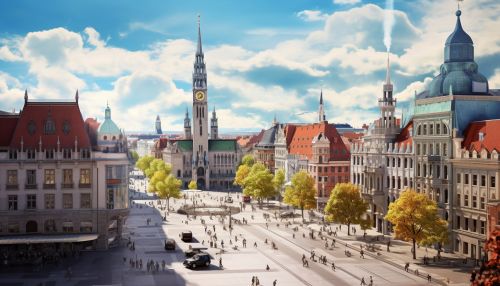Fyodor Tyutchev
Early Life
Fyodor Ivanovich Tyutchev was born on December 5, 1803, in the family estate of Ovstug near Bryansk. He belonged to an old noble family tracing its history back to the 15th century. His father, Ivan Tyutchev, served as a governor in several provinces of the Russian Empire. His mother, Ekaterina Tolstaya, was a distant relative of the famous Russian writer Count Leo Tolstoy.


Tyutchev's early education was in the hands of private tutors at home. In 1819, he moved to Moscow to continue his studies at the prestigious Moscow State University. There, he studied philology and diplomacy, showing a particular interest in the works of the ancient Greek philosophers.
Career
After graduating from the university in 1822, Tyutchev joined the Russian Foreign Ministry and was posted to Munich as a junior diplomat. He served in various European capitals, including Turin and Munich, for the next 22 years. During this period, he became acquainted with several prominent figures of European culture, including the German philosopher Friedrich Wilhelm Joseph Schelling and the poet Heinrich Christian Johann Heine.


Tyutchev's diplomatic career was marked by his keen interest in European politics and culture. He wrote extensively on these topics, contributing to several Russian and European publications. His writings were noted for their insightful analysis and deep understanding of European society.
Literary Work
While Tyutchev is best known for his diplomatic career, he is also recognized as one of the most significant Russian poets of the 19th century. He began writing poetry in his early teens, but it was during his time in Europe that his literary talent truly blossomed.


Tyutchev's poetry is characterized by its deep philosophical themes, its exploration of nature and the human soul, and its use of innovative linguistic techniques. His works are often compared to those of his contemporaries, such as Alexander Sergeyevich Pushkin and Mikhail Yuryevich Lermontov, but his unique style and themes set him apart.
Later Life and Death
Tyutchev returned to Russia in 1844 and spent the remainder of his life there. He continued to write poetry and engage in political discourse, becoming a respected figure in Russian society. He passed away on July 27, 1873, in Tsarskoe Selo, leaving behind a rich legacy of diplomatic service and literary contributions.


Legacy
Tyutchev's influence on Russian literature and culture is significant. His poetry, marked by its philosophical depth and linguistic innovation, has inspired many subsequent Russian writers. His diplomatic writings, with their insightful analysis of European politics and culture, remain relevant to this day.
